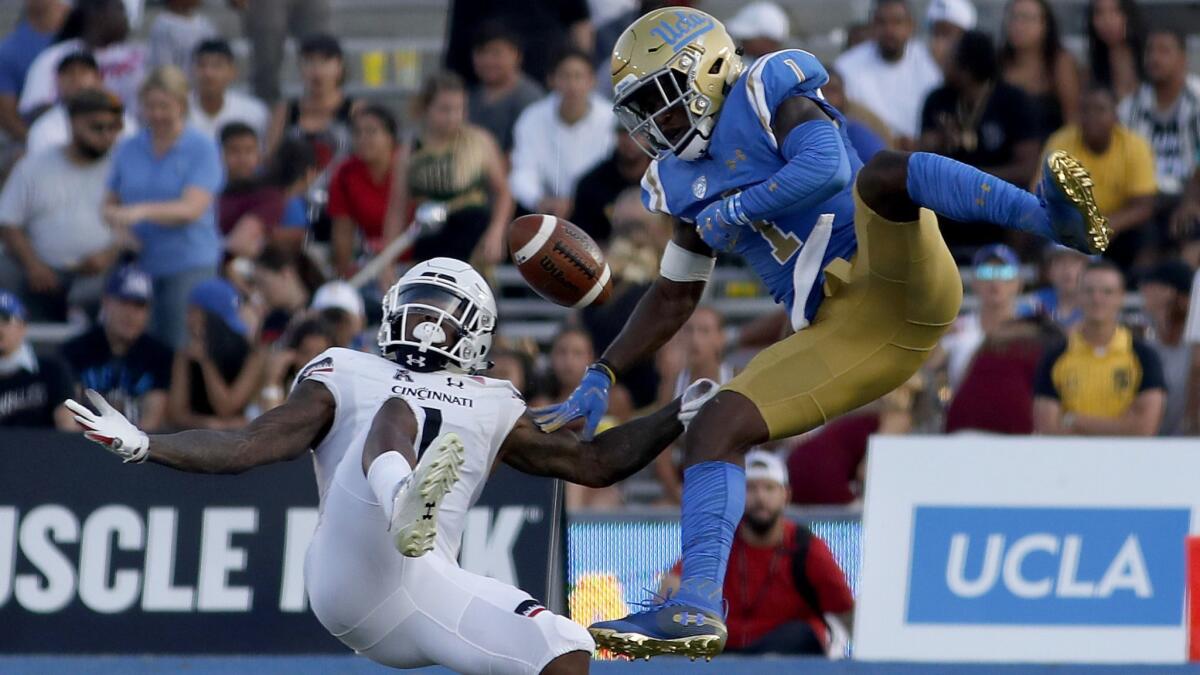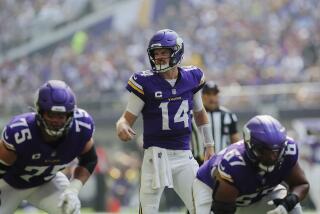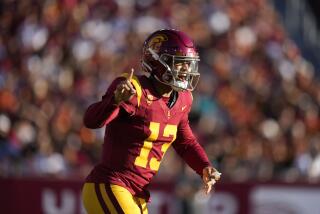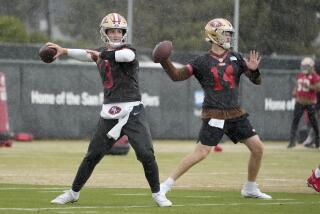Darnay Holmes has shown plenty of resolve as a cornerback for UCLA

Darnay Holmes entered the hospital room to find his father handcuffed to the bed.
Darick Holmes’ body was riddled with seven bullets, the result of a drug deal gone bad. He survived, but only after pretending to be dead so that the assailant would stop shooting.
It would not be the last time Darnay, a sophomore cornerback at UCLA, had to deal with crushing circumstances.
His sister had two miscarriages. A 15-year-old friend was fatally shot by an off-duty law enforcement officer. After Holmes and the Bruins lost in the Cactus Bowl in December, he had to help his evicted mother move out of her apartment following a job loss.
Holmes has reacted to each blow as if he’s impervious to pain, smiling through the hardship. He explained that his sunny demeanor comes from believing in a larger purpose.
“Just know that everything that’s thrown at me is happening for a reason, you know?” Holmes said this week while seated on a wooden bench outside the Wasserman Football Center. “The bad is always going to turn into the good.”
Considering all that Holmes has been through, his team’s 0-2 start this season seems like nothing more than an alternate route to the same destination. Holmes has already persevered through worse football detours.
Wide open in the flat during his final high school game, Holmes dropped a sure touchdown pass that would have sent Calabasas’ state championship game into a second overtime. Players from San Diego Madison pranced around the field in celebration while Holmes crouched in dejection in a corner of the end zone, resting his elbow on his knee and his face on his hand.
Holmes was ripped on social media. Rather than respond, he unleashed his fury during a training session the next morning.
“I couldn’t just lay down on the bed and just think about what happened,” Holmes said, “so I had to go perfect my craft and have a sense that I’m still that guy I think I am.”
Holmes has used the same relentlessness to become a top-flight defender after an uneven freshman season in which he led the Bruins with three interceptions but also was twice ejected for targeting, forcing him to sit out parts of three games.
He broke up a deep pass on Oklahoma’s first play from scrimmage last weekend and the Sooners rarely threw the ball in his vicinity again. When they tried late in the third quarter, Holmes stepped in front of the pass to make an interception.
UCLA coach Chip Kelly said Holmes’ play was a reflection of “an unbelievable work ethic” that made him one of the team’s best players in practice in the days before the game.
“You see him every day working, working, working, asking for advice, always wanting to learn,” senior cornerback Nate Meadors said.
Holmes has also become more patient, trusting his technique and ability to make plays within the coverage plan instead of freelancing in hope of becoming a savior. He called it “just not being Superman when Superman’s not needed,” repeating a phrase popularized by fellow defensive back Jay Shaw.
Some of Holmes’ improvements are the result of film study with his father. Darick Holmes, a former NFL running back who spent five seasons with the Buffalo Bills, Green Bay Packers and Indianapolis Colts, ran a lifestyle reverse after his recovery from the shooting when Darnay was 12. He stopped selling drugs in favor of speaking with kids about making the right choices.
Darick taught professional habits through Proway Training, a football academy that incorporated many of the same techniques he had used years earlier with Darnay and his older brother, Darick Jr. The academy’s alumni include many college players, including Oklahoma’s T.J. Pledger and Brendan Radley-Hiles.
One of the core philosophies is to embrace the duress required for excellence.
“If you want to be great,” Darick said, “you’ve got to do what everybody else isn’t doing — you’ve got to get up early, you’ve got to be the first one there, the last one to leave.”
When Darnay was a freshman, Darick attended each of his training camp practices to keep tabs on him. But when the elder Holmes showed up at a practice last month, there wasn’t much to see. Trainers were keeping Darnay out of the session because GPS tracking monitors indicated that the player striving to be faster than Hall of Famer Deion Sanders had already overexerted himself as a result of his own training.
It was the end of frequent-observer status for Darick. His guidance was no longer needed on the field or in the classroom, where Darnay is on track to get a degree in African American studies in three years.
“He grew up, he’s matured,” Darick said. “I don’t have to really be there to be like, ‘Hey, why didn’t you do that?’ He knows and he’s doing it now.”
Darnay said his resolve comes from his brother, the receiver known as “Mighty Dog” who earned a scholarship at Arizona despite standing only 5 feet 5 and 179 pounds. Darick Jr. didn’t log any stats in his three years with the Wildcats, recently departing to train in Southern California with hopes of resuming his college career elsewhere.
“His journey didn’t pan out how he wanted it to be,” said Darnay, who is 5-10 and 198, “but the end result is going to be the better part of the journey and he’s just working to get to that end result.”
Things have a way of working out for Darnay’s family. Darick is fully recovered from the shooting that left him unable to walk for six months. Johnnay Daniels, Darnay’s mother, has found a new home. And Derica Holmes, Darnay’s sister, is expected to give birth to a healthy boy in November.
“We’re all fine now,” Darnay said, his eyes gleaming, his smile wide. “We’re doing straight.”
Follow Ben Bolch on Twitter @latbbolch
More to Read
Go beyond the scoreboard
Get the latest on L.A.'s teams in the daily Sports Report newsletter.
You may occasionally receive promotional content from the Los Angeles Times.







